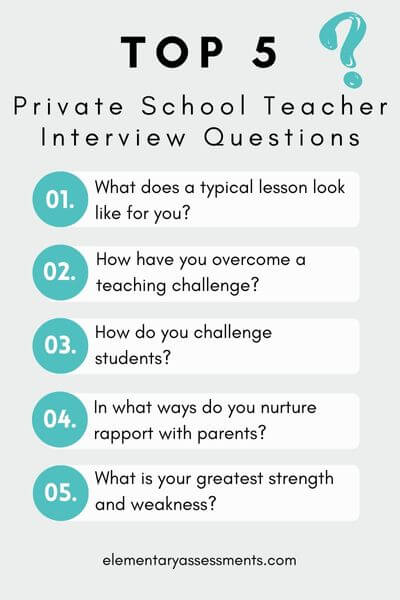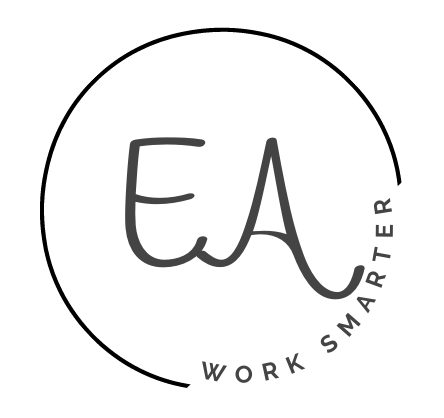If you’re looking for a teaching job in a private school, here you will find common private school interview questions for teachers along with suggested answers.
Teaching in private schools is a slightly different experience.
Hiring committees in private schools are looking for a specific type of skill set, personality, and mindset when it comes to educators looking to teach in private schools.
While you may be a master at handling disruptive students, struggling learners, and absentee parents, in a private school setting, these skills (while helpful) will only get you so far.
When preparing for private school interviews as a teacher, think about how you will challenge high-performing students, involve active parents, and stay connected in a close-knit school community.
Private schools are very student, parent, and community-centered. So think about how your teaching style and personality will fit.
Your mindset and expectations should align with the goals of the private school to which you are applying.
To help you get into the right mindset and nail your private school teaching interview, I’ve compiled these private school interview questions for teachers that you should review.
Interview Questions and Answers for Teachers In Private Schools
Review these common private school interview questions for teachers with suggested answers so that you nail your private school teaching interview and get the job.
1. What interests you in working at this particular school?
This question gives insight into why you are applying to this particular private school and whether or not you understand what makes the school unique.
The hiring committee also wants to know how well you researched the school. In which programs, missions, and school goals are you most interested?
Example: “I love the variety of extracurricular activities offered at this school. Students have opportunities to learn new skills and participate in exciting activities. Furthermore, I see a great benefit in the small teacher-to-student ratio which allows more one-on-one time for teachers to assist students.
The experience at this private school seems to be a more enriched learning experience for students. I’ve done a lot of research on your school and am impressed with the programs you offer your students.”
2. In what ways do you nurture rapport with parents?
In private schools, community and parent involvement are big focuses. Part of your success as a private school teacher will be how well you involve yourself in community and parent interests.
Essentially, this question is meant to gauge how you build rapport with parents.
Example: “To nurture rapport with parents, I try to involve them from day one. At the start of the school year, I initiate contact by sending an email or letter introducing myself. I communicate that I’ll be sending weekly class newsletters, and I let them know that they’re always free to contact me via email with any questions or concerns.
During Back-to-School night, I encourage parents to sign-up to volunteer for classroom activities and events. I have a sign-up sheet with all the yearly activities posted so that they can sign-up right there.
I also try to send home kind notes about each student at least once a month. That way, if I ever need to share less-than-pleasant news with parents, they are more likely to respond in a positive manner.”
Related Content:
3. Will you tell us a little about yourself?
Of all the private school interview questions for teachers, this one is probably the most common and expected.
This question is meant to assess your personality, mindset, skill set, and likes. This is also an opportunity for you to offer any personal information that you feel comfortable sharing.
Example: “My name is Bianca, and I just finished my 12th year of teaching at an international school abroad. In my 12 years of teaching, I’ve taught grades 2-5 in public and private schools. What I love most about teaching is exposing students to new ideas and concepts daily. It’s an amazing experience to be able to help shape their perspective of the world.
In my spare time, I like reading, biking, traveling, and spending time with friends and family. Also, I’m a pet lover.”

4. What is your greatest strength and weakness?
This question is meant to determine which of your strengths will help the school to advance in some area. It also reveals if you’re “coachable”.
Example: “My greatest strength is my love of collaboration. I realize how demanding the teaching profession can be. Working with a team alleviates some of the workload. It’s really about working smarter.
I also enjoy working with parents and other professionals in the school community to create the best possible learning experience for students.
A weakness of mine is my dislike for a lack of structure. I like structure in my classroom. When that structure is unexpectedly interrupted, it’s frustrating for me because it breaks students’ learning flow and my teaching flow. Getting things back on track can be a hassle.
I understand that things don’t always go as planned; that is part of life. So what I work on is how I respond to those situations. Now, I try to mentally prepare myself for the unexpected when at work.”
Related Content:
5 Things NOT to Do During a Private School Teacher Interview
5. How do you challenge students?
This question is meant to assess how well you maintain high standards for students. How well do you differentiate lessons for more advanced learners? How do you keep students engaged, motivated, and interested in the subject matter?
Example: “To challenge students, I provide extension activities that involve higher-order thinking skills, assign project-based learning activities, and encourage class discussions that involve critical thinking.
Furthermore, I create a classroom environment where it’s okay to take risks and make mistakes. I do this by extending appropriate amounts of positive reinforcement.”
6. What does a typical lesson look like for you?
With this question, the hiring committee seeks knowledge about your skill set and lesson plan structure. How do you organize a lesson so that it maximizes the learning experience for students?
This question gives an inside look into the candidate’s teaching style.
Example: “A typical lesson for me is generally made up of three parts: the beginning, middle, and end. At the beginning of the lesson, there’s always something to hook students’ attention quickly like a warm-up or bell ringer.
Then I go into the mini-lesson which is meant to introduce the skill or strategy that I’m going to be teaching for this lesson. This is when I model the strategy.
During the meat of the lesson, the middle part, students are working independently, in small groups, or in pairs. I am conferencing one-on-one or with small groups of students. This provides a great time for me to differentiate instruction and give additional support to those students who need it.
You may see students interacting with manipulatives, anchor charts, and/or technology. It just depends on what we’re working on that particular day. I use whatever resources are available to support students’ understanding of the concepts.
At the end of the lesson, I gather the students again and summarize what we just learned. Some students share with the class what they “took away” from the lesson. Sometimes, I give an exit ticket question to all in order to assess how well they grasped the concept.
Doing so arms me with the information I need to plan future lessons that fill learning gaps.”
7. How would you handle demanding parents?
This question is meant to gauge how well you handle parents who strongly demonstrate a need to control how you manage your classroom, procedures, and routines.
Example: “In addition to building parent rapport from the start of the school year, I aim to be transparent about classroom expectations from day one. Clearly communicating my expectations during Back-to-School Night, during the weekly newsletters, and as needed, lets parents know my standards.
I do my best to work with parents to resolve any concerns, and I believe good results can happen within healthy boundaries.”
8. What book are you currently reading?
This interesting question assesses your knowledge level, interests, and how much effort you put into continuing education.
Example: “A really good professional book I’m currently reading is called Why Didn’t I Learn This In College? by Paula Rutherford. This book was given to me when I was a first-year teacher, and it’s been a mainstay on my classroom bookshelf ever since. I reference it regularly. It contains so many helpful tips for every type of classroom topic imaginable.
On a personal level, I like to read a lot of self-help books because I like to keep my mind nourished with positive messages and inspiration. One book in particular that I’m reading at the moment is called Don’t Sweat the Small Stuff by Richard Carlson.”
9. How have you overcome a teaching challenge?
This question is meant to assess your ability to problem-solve and seek help when needed.
Example: “My biggest teaching challenge is reaching the academically low students and also challenging the advanced learners. I suggest after-school tutoring to struggling students and strive to meet with them during class time a few times a week in small groups or one-on-one.
For the advanced students, I provide project-based learning extension activities. They also benefit greatly from early finisher activities that are engaging and challenging.
When planning, I make sure to include differentiated lessons that address a variety of learning styles.”
10. Do you have any questions for us?
This question aims to discover how well you prepared for the interview.
Even if you do your due diligence in researching a school, there may still be some lingering questions that have yet to be answered.
The goal here is to close information gaps from the interview.
Example:
- “What big goals does the school have for the upcoming year?
- “Why is this particular position available? What happened to the previous teacher?”
- “How would you describe the school’s culture?”
- “When may I expect to hear from you regarding your hiring decision?”
Final Thoughts: Private School Interview Questions for Teachers
Participating in an interview for a private school teaching position is a little different from other teacher interviews.
These private school interview questions for teachers provide the information you need to get into the right mindset of what a private school hiring committee may be looking for in teaching candidates.
Using these private school interview questions for teachers, you’ll feel prepared going into the interview and also more confident.
If you model yourself after these questions, you’ll be steps ahead of the competition!
If you found these interview questions and answers for teachers in private schools helpful, you might like these helpful teacher interview tips.
